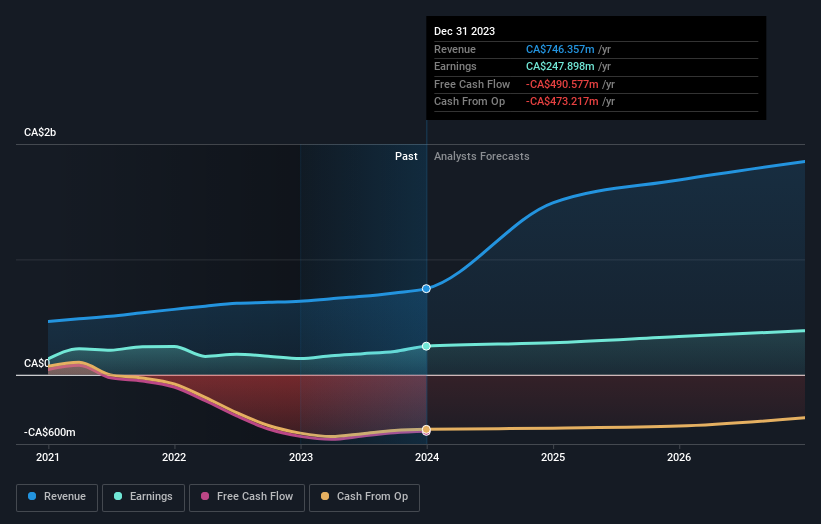Stock Analysis
- Canada
- /
- Consumer Finance
- /
- TSX:GSY
goeasy Ltd.'s (TSE:GSY) market cap dropped CA$89m last week; Retail investors bore the brunt

Key Insights
- Significant control over goeasy by retail investors implies that the general public has more power to influence management and governance-related decisions
- The top 25 shareholders own 37% of the company
- Insiders have sold recently
To get a sense of who is truly in control of goeasy Ltd. (TSE:GSY), it is important to understand the ownership structure of the business. With 60% stake, retail investors possess the maximum shares in the company. Put another way, the group faces the maximum upside potential (or downside risk).
While insiders who own 22% came under pressure after market cap dropped to CA$2.7b last week,retail investors took the most losses.
In the chart below, we zoom in on the different ownership groups of goeasy.
See our latest analysis for goeasy

What Does The Institutional Ownership Tell Us About goeasy?
Institutions typically measure themselves against a benchmark when reporting to their own investors, so they often become more enthusiastic about a stock once it's included in a major index. We would expect most companies to have some institutions on the register, especially if they are growing.
We can see that goeasy does have institutional investors; and they hold a good portion of the company's stock. This suggests some credibility amongst professional investors. But we can't rely on that fact alone since institutions make bad investments sometimes, just like everyone does. When multiple institutions own a stock, there's always a risk that they are in a 'crowded trade'. When such a trade goes wrong, multiple parties may compete to sell stock fast. This risk is higher in a company without a history of growth. You can see goeasy's historic earnings and revenue below, but keep in mind there's always more to the story.

We note that hedge funds don't have a meaningful investment in goeasy. Our data shows that Donald Johnson is the largest shareholder with 18% of shares outstanding. The second and third largest shareholders are Mawer Investment Management Ltd. and David Ingram, with an equal amount of shares to their name at 2.2%. David Ingram, who is the third-largest shareholder, also happens to hold the title of Chairman of the Board. Additionally, the company's CEO Jason Mullins directly holds 0.6% of the total shares outstanding.
On studying our ownership data, we found that 25 of the top shareholders collectively own less than 50% of the share register, implying that no single individual has a majority interest.
While studying institutional ownership for a company can add value to your research, it is also a good practice to research analyst recommendations to get a deeper understand of a stock's expected performance. There are a reasonable number of analysts covering the stock, so it might be useful to find out their aggregate view on the future.
Insider Ownership Of goeasy
The definition of an insider can differ slightly between different countries, but members of the board of directors always count. Company management run the business, but the CEO will answer to the board, even if he or she is a member of it.
Most consider insider ownership a positive because it can indicate the board is well aligned with other shareholders. However, on some occasions too much power is concentrated within this group.
Our most recent data indicates that insiders own a reasonable proportion of goeasy Ltd.. It is very interesting to see that insiders have a meaningful CA$581m stake in this CA$2.7b business. Most would be pleased to see the board is investing alongside them. You may wish to access this free chart showing recent trading by insiders.
General Public Ownership
The general public -- including retail investors -- own 60% of goeasy. With this amount of ownership, retail investors can collectively play a role in decisions that affect shareholder returns, such as dividend policies and the appointment of directors. They can also exercise the power to vote on acquisitions or mergers that may not improve profitability.
Next Steps:
While it is well worth considering the different groups that own a company, there are other factors that are even more important. Like risks, for instance. Every company has them, and we've spotted 4 warning signs for goeasy (of which 2 shouldn't be ignored!) you should know about.
If you are like me, you may want to think about whether this company will grow or shrink. Luckily, you can check this free report showing analyst forecasts for its future.
NB: Figures in this article are calculated using data from the last twelve months, which refer to the 12-month period ending on the last date of the month the financial statement is dated. This may not be consistent with full year annual report figures.
Valuation is complex, but we're helping make it simple.
Find out whether goeasy is potentially over or undervalued by checking out our comprehensive analysis, which includes fair value estimates, risks and warnings, dividends, insider transactions and financial health.
View the Free AnalysisHave feedback on this article? Concerned about the content? Get in touch with us directly. Alternatively, email editorial-team (at) simplywallst.com.
This article by Simply Wall St is general in nature. We provide commentary based on historical data and analyst forecasts only using an unbiased methodology and our articles are not intended to be financial advice. It does not constitute a recommendation to buy or sell any stock, and does not take account of your objectives, or your financial situation. We aim to bring you long-term focused analysis driven by fundamental data. Note that our analysis may not factor in the latest price-sensitive company announcements or qualitative material. Simply Wall St has no position in any stocks mentioned.
About TSX:GSY
goeasy
goeasy Ltd. provides non-prime leasing and lending services under the easyhome, easyfinancial, and LendCare brands to consumers in Canada.
High growth potential, good value and pays a dividend.

